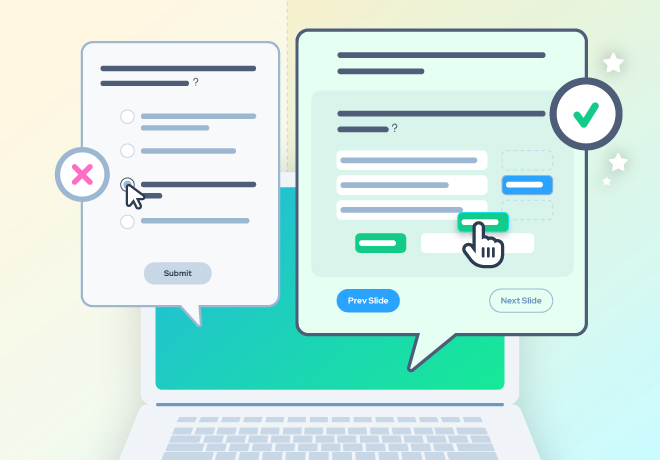
Guesswork to Growth: How Knowledge Checks Boost Training Effectiveness

Related articles
Get valuable eLearning insights to your inbox.
Listen to Neovation’s Demystifying eLearning podcast generated with NotebookLM!
Listen to our podcast on your favorite platform!
Does this sound familiar? Your company invests significant time and resources into employee training, only to find that weeks later, very little has changed on the job.
When training is a passive, continuous stream of information, the vast majority of it is forgotten shortly after the session ends, failing to translate into tangible, on-the-job improvements.
This is where knowledge checks come in, transforming your training from guesswork to growth. Far more than a simple quiz, a knowledge check is a strategic tool designed to combat learning decay, confirm understanding in real-time, and empower employees to take ownership of their progress. This post will answer the key questions:
- What is a knowledge check?
- Are knowledge checks effective?
- How do you use knowledge checks to improve knowledge retention, employee performance, and your training ROI?
What Is a Knowledge Check?
A knowledge check is an informal, low-stakes assessment tool used during the learning process. Unlike a final exam, these checks are typically ungraded and untracked. Like other instructional design strategies, knowledge checks are designed to help employees review material and gauge their own understanding as they move through a training module, often appearing at the end of a topic or a key concept.
It's crucial to differentiate these learning checks from formal, graded quizzes. The two serve very different purposes:
- A formal quiz is a summative tool used to validate comprehension for a grade or certification. It measures what a person has learned after the fact.
- In contrast, the primary goal of a knowledge check is reinforcement and self-awareness in a pressure-free environment. It's a formative tool and allows for multiple attempts and can redirect learners back to the content if they answer incorrectly, making it part of the learning experience itself, not just a test of it.
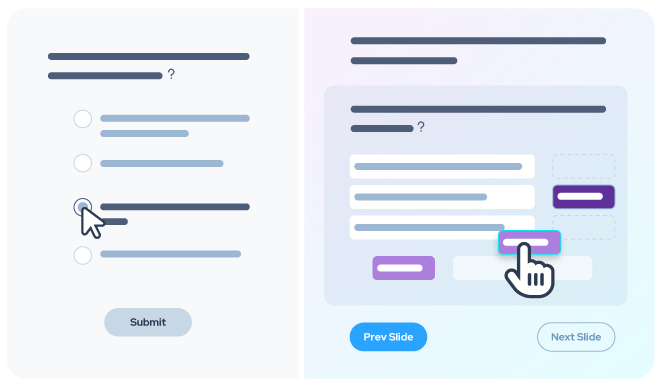
Think of it this way: a knowledge check is a helpful GPS check-in on a learning journey, confirming you're on the right path. A formal quiz is the final destination, intended to prove you've successfully completed the trip.
Are knowledge checks effective? The link between testing and retention
So, are knowledge checks effective? The science of learning says yes. Knowledge checks are a practical and low-stakes application of a powerful psychological principle called the testing effect.
They transform learning from a one-way street into an interactive dialogue. Instead of simply consuming a continuous stream of information, learners are prompted to pause, process, and pull out what they’ve just been taught.
This process of eliciting performance and providing immediate feedback is crucial for cementing information, correcting misunderstandings, and preventing learners from moving forward with critical knowledge gaps.
The benefits of this active approach are twofold:
- For the learner: This constant reinforcement builds confidence and leads to genuine skill mastery. By successfully recalling information throughout a course, learners aren't just memorizing facts for a final exam; they are building a durable foundation of knowledge they can apply on the job.
- For the business: When used consistently, effective learning checks provide invaluable data. They help identify company-wide knowledge gaps where training may need to be clarified or expanded. In critical areas, this can directly mitigate compliance and safety risks by ensuring procedures are not just taught, but understood. Ultimately, incorporating knowledge checks into your training helps build a culture of continuous improvement, where learning is an ongoing, engaging, and measurable process.
How to Use Knowledge Checks Strategically Throughout Training
When you use a knowledge check is just as important as how you design it. Strategic timing is critical for maximizing impact, turning a simple question into a powerful tool for engagement and retention. While they are most commonly used during training, they can be deployed at three key stages of the learning journey.
- Before training: An initial knowledge check is a diagnostic tool used before a learner even begins a course. Its purpose is to gauge their existing knowledge on the topic. For new employees or those new to a subject, this baseline from the initial knowledge check can help tailor the experience.
- During training: This is the most frequent and essential use of a knowledge check. Woven into the fabric of a course, these formative knowledge checks serve several key functions like preventing information overload, providing immediate feedback, and reinforcing knowledge acquisition.
- After training: Placed immediately after a module is completed, this final knowledge check serves as a summative tool. It measures the immediate knowledge a learner has acquired and, just as importantly, provides critical feedback on the training's effectiveness.
From multiple-choice to scenarios: Designing a better knowledge check
Effective knowledge checks must align with specific learning objectives, use varied formats like scenarios to test application, and provide immediate, explanatory feedback. This approach ensures you are assessing real-world skills instead of just memorization, turning every question into a valuable micro-learning opportunity.
Use this quick checklist to guide your design process:

- Align to a specific goal: Tie every question directly to a learning objective. Focus on what the employee needs to be able to do after the lesson.
- Vary your question types: Move beyond basic multiple-choice. Use scenarios, drag-and-drops, and hotspots to test real-world application and critical thinking.
- Provide explanatory feedback: Go beyond just "Correct/Incorrect." Instantly explain why an answer is right or wrong to turn every question into a micro-lesson.
- Allow multiple attempts: Encourage learning from mistakes in a pressure-free environment by letting users try a question more than once.
- Keep it focused and brief: Design each knowledge check to cover a single concept or topic to reinforce learning without overwhelming the user.
Build Training That Works with Neovation's Custom Learning Solutions
Moving beyond simple quizzes to create truly effective knowledge checks requires expertise in instructional design, adult learning principles, and technology. It’s the key to unlocking the true potential of your corporate training and ensuring that your investment leads to tangible skills and improved performance.
Ready to build eLearning that drives real business results? Neovation’s instructional design team specializes in creating custom learning solutions with strategically designed learning checks that ensure retention, application, and a measurable return on your investment.
Contact us today to learn how we can transform your corporate training from a cost center into a competitive advantage.

Alex is an experienced writer and marketer with an interest in all things education. With a background in literary theory, technical writing, and document design, he is interested in how learners make meaning from language and how to create meaningful connections through writing.
Become part of our L&D community
We publish a new learning hub article — full of useful, practical topics — weekly.
Not sure where where you want to start? Jump into one of our recently published articles and see where it takes you!




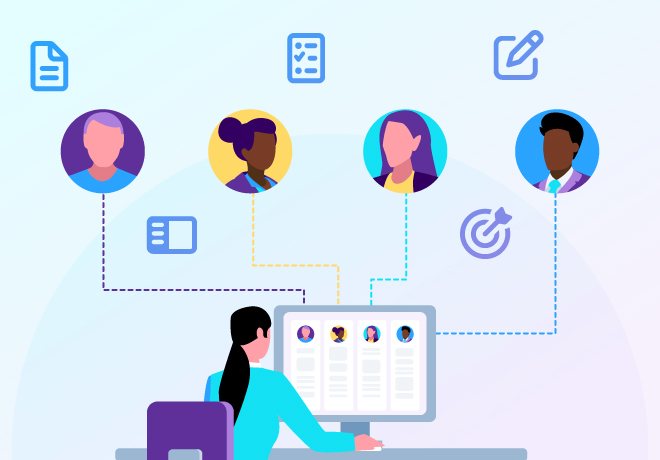
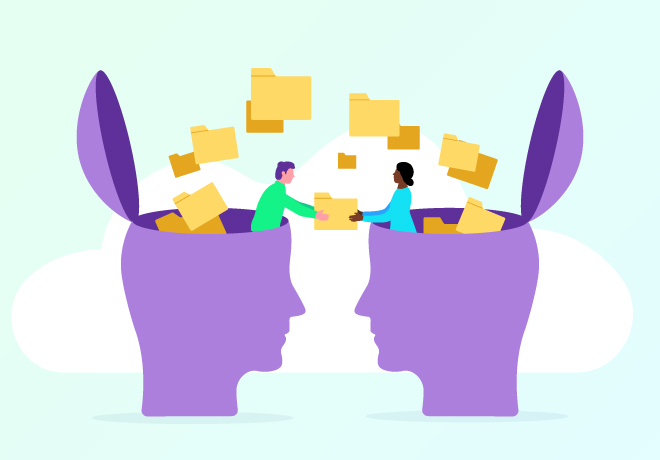
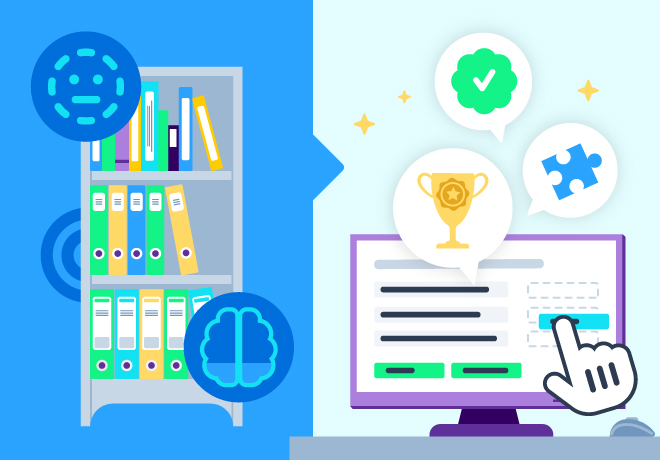
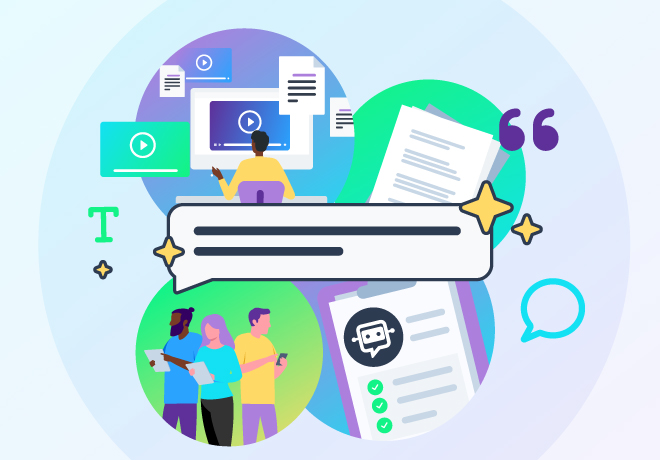
-svg.svg)
-svg.svg)
-svg.svg)
-svg.svg)